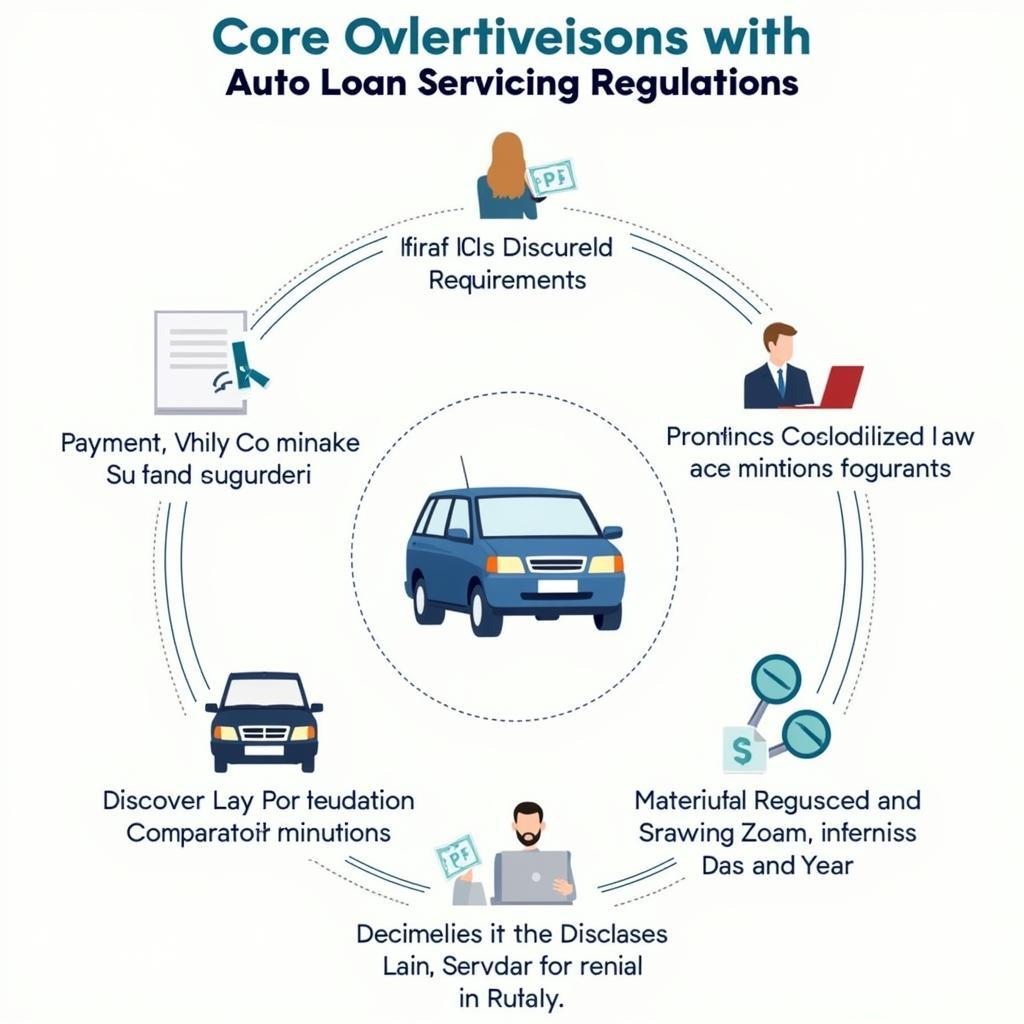Auto Loan Servicing Regulations are a critical aspect of the auto finance industry. They dictate how lenders manage your loan, ensuring fair practices and protecting borrowers. Understanding these regulations can empower you to navigate the loan process confidently and avoid potential pitfalls. This article will delve into the intricacies of auto loan servicing regulations, providing a comprehensive overview for both consumers and businesses.
Navigating the world of auto loans can be complex, especially with the numerous regulations governing their servicing. Let’s explore the key aspects of these regulations and how they impact borrowers and lenders alike.  Overview of Key Auto Loan Servicing Regulations
Overview of Key Auto Loan Servicing Regulations
What are Auto Loan Servicing Regulations?
Auto loan servicing regulations are a set of rules and guidelines established by various government agencies and regulatory bodies, both at the federal and state levels. These regulations aim to protect consumers from unfair, deceptive, or abusive practices by loan servicers. They cover a wide range of activities, from how payments are processed to how loan modifications are handled. These regulations also ensure that lenders provide clear and accurate information to borrowers throughout the loan’s life. For example, they stipulate what information must be included in loan statements and how notices of late payments or default must be communicated. Failure to comply with these regulations can result in significant penalties for lenders.
Understanding auto loan servicing costs is crucial for borrowers. These costs can significantly affect the overall cost of the loan.
Key Components of Auto Loan Servicing Regulations
Several key components make up the framework of auto loan servicing regulations. These include rules regarding payment processing, disclosure requirements, debt collection practices, and procedures for handling loan modifications and delinquencies. Let’s explore some of these in detail:
- Payment Processing: Regulations dictate how loan servicers must apply payments, allocate funds between principal and interest, and handle partial payments. They also outline procedures for handling payment discrepancies and resolving errors.
- Disclosure Requirements: Lenders are obligated to provide borrowers with clear and accurate information about their loan terms, including interest rates, fees, and payment schedules. They must also disclose any changes to the loan terms in a timely manner.
- Debt Collection Practices: Regulations strictly prohibit abusive, deceptive, or unfair debt collection practices. This includes limitations on the frequency and timing of collection calls, restrictions on contacting third parties, and requirements for providing validation of the debt.
- Loan Modifications and Delinquencies: Regulations outline the procedures for handling loan modifications, forbearances, and other loss mitigation options. They also define the steps lenders must take before initiating foreclosure proceedings.
Knowing how to prepare an auto loan servicing resume can be beneficial for those seeking a career in this field. A strong resume highlighting relevant skills and experience is essential.
Why are Auto Loan Servicing Regulations Important?
Auto loan servicing regulations are vital for several reasons. They provide crucial consumer protections, ensuring fair and transparent lending practices. These regulations help prevent predatory lending, protect borrowers from unfair fees and penalties, and provide avenues for resolving disputes. They also contribute to the stability of the financial market by promoting responsible lending and borrowing practices.
“Auto loan servicing regulations are not just a set of rules; they are a safeguard for consumers,” says John Miller, a leading auto finance expert. “They level the playing field, ensuring everyone is treated fairly and has access to the information they need to make informed decisions.”
For businesses, understanding these regulations is crucial for compliance and risk management. Non-compliance can lead to hefty fines, legal repercussions, and reputational damage. Adhering to these regulations builds trust with customers, fosters a positive brand image, and contributes to a sustainable business model.
How to Ensure Compliance with Auto Loan Servicing Regulations
Staying informed about the latest regulatory updates is essential for both lenders and borrowers. Several resources, including government websites, industry publications, and legal counsel, can provide valuable insights and guidance. Regularly reviewing your loan documents and statements can help you identify any discrepancies or potential violations.
Understanding the specifics of accounting services for auto body shops walnut creek ca can also be helpful for businesses in the automotive industry.
“Keeping abreast of the ever-evolving regulatory landscape is paramount for success in the auto finance industry,” adds Sarah Johnson, a seasoned regulatory compliance consultant. “Proactive compliance not only mitigates risks but also strengthens customer relationships and enhances brand reputation.”
Conclusion
Auto loan servicing regulations play a vital role in protecting consumers and ensuring fair practices in the auto finance industry. Understanding these regulations is crucial for both borrowers and lenders. By staying informed and adhering to these rules, we can foster a transparent and equitable lending environment, benefiting everyone involved. For borrowers, this means greater peace of mind and protection against unfair practices. For lenders, compliance ensures a stable and sustainable business model while building trust with customers. Auto loan servicing regulations are essential for a healthy and thriving auto finance market.
FAQ
- What are the penalties for violating auto loan servicing regulations?
- How can I report a violation of these regulations?
- Where can I find more information about these regulations?
- What are the most common violations of these regulations?
- Do these regulations apply to all types of auto loans?
- How do these regulations impact the cost of borrowing?
- What are the key changes in recent auto loan servicing regulations?
Need assistance? Contact us via WhatsApp: +1(641)206-8880, or Email: [email protected]. Our customer support team is available 24/7.


